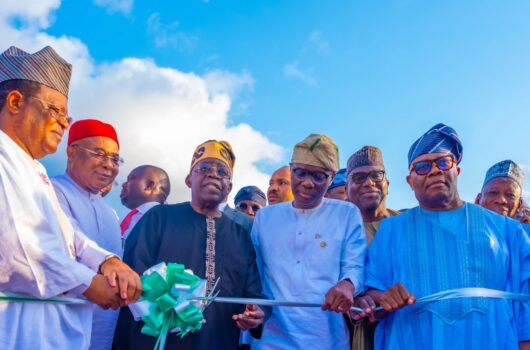 President Bola Tinubu officially launched the construction of the ambitious 700-kilometer Lagos-Calabar coastal road on Sunday, marking a significant step in enhancing Nigeria’s infrastructure. The event, held in the Victoria Island area of Lagos State, saw the attendance of several top government officials, including the Minister of Works, Dave Umahi, and Senate President Godswill Akpabio.
President Bola Tinubu officially launched the construction of the ambitious 700-kilometer Lagos-Calabar coastal road on Sunday, marking a significant step in enhancing Nigeria’s infrastructure. The event, held in the Victoria Island area of Lagos State, saw the attendance of several top government officials, including the Minister of Works, Dave Umahi, and Senate President Godswill Akpabio.
Also present were Governor Babajide Sanwo-Olu of Lagos, Governor Dapo Abiodun of Ogun, Governor Hope Uzodimma of Imo State, and Kwara State Governor Abdulrahman Abdulrazaq.
Expressing optimism about the project’s completion, President Tinubu described the day as his “bragging day,” reinforcing his administration’s commitment to seeing the project through. “It’s my bragging day,” he said. “We said we would do this road. We will do this road. We are determined to do it.”
The Lagos-Calabar coastal highway, estimated to cost N15 trillion, has faced criticism since its inception in March, particularly from opposition figures such as former Vice President Atiku Abubakar and Peter Obi, the Labour Party’s presidential candidate in the 2023 election. Critics have raised concerns about the project’s transparency, costs, and the potential demolition of existing structures.
In response to some of these concerns, the Federal Government adjusted the project route to avoid damaging submarine cables, reverting to the gazetted route within certain kilometers of the highway.
During the flag-off event, President Tinubu highlighted the transformative potential of the coastal road, describing it as a symbol of hope, unity, and prosperity. “The project is more than a mere road. It is a symbol of hope, unity, and prosperity. It will connect communities, bring prosperity to people, and create opportunities for millions,” he said.
He also commended Minister Umahi for his dedication to the project, emphasizing the future benefits to Nigeria’s tourism sector and overall economic growth.
The Lagos-Calabar coastal road is expected to significantly enhance connectivity between the southern coastal states, fostering economic integration and regional development.

NOC Meets Deadline For 2030 Commonwealth Games Expression Of Interest
INEC Rejects Petition To Recall Senator Natasha Akpoti-Uduaghan
President Tinubu Set To Depart For Two-Week Working Visit To Paris
Tinubu Reconstitutes NNPC Board, Appoints New Leadership